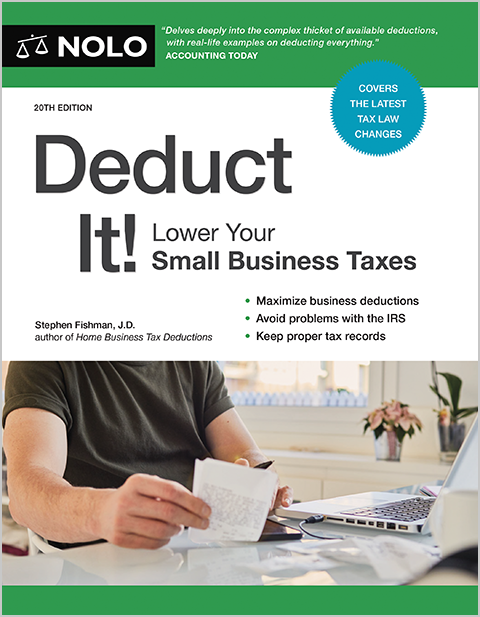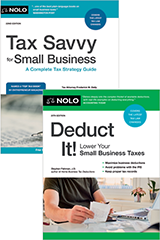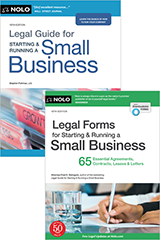New Edition!
Deduct It!
Lower Your Small Business Taxes
- Product Details
- start-up and operating expenses
- travel and meals
- home offices
- medical expenses
- equipment and inventory,
- and more.
- About the Author
- Table of Contents
- How Tax Deductions Work
- How Businesses Are Taxed
- The Value of a Tax Deduction
- What Businesses Can Deduct
- Businesses That Lose Money
- What Is a Business?
- Tax Consequences of Being a Hobbyist
- What Are Start-Up Expenses?
- Starting a New Business
- Buying an Existing Business
- Expanding an Existing Business
- When Does a Business Begin?
- Claiming the Deduction
- If Your Business Doesn’t Last 15 Years
- Organizational Expenses
- Requirements for Deducting Operating Expenses
- Operating Expenses That Are Not Deductible
- Tax Reporting
- What Is a Long-Term Asset?
- Deducting Inexpensive Property: The De Minimis Safe Harbor and Materials and Supplies Deduction
- Deducting Long-Term Personal Property: Section 179, Bonus Depreciation, Regular Depreciation
- Section 179 Expensing
- Bonus Deprepreciation
- Deducting Repairs and Improvements
- Regular Depreciation
- Deducting Real Property
- Intangible Assets
- Tax Reporting and Record Keeping
- Leasing Long-Term Assets
- What Is Inventory?
- Deducting Inventory Costs
- Qualifying for the Home Office Deduction
- Corporation Employees
- Calculating the Home Office Deduction
- Simplified Home Office Deduction Method
- IRS Reporting Requirements
- Deducting an Outside Office or Workplace
- Deductible Local Transportation Expenses
- The Standard Mileage Rate
- The Actual Expense Method
- Other Local Transportation Expenses
- Tax Credits and Deductions for Electric Vehicles
- When Clients or Customers Reimburse You
- Reporting Transportation Expenses on Schedule C
- Corporations, LLCs, and Partnerships
- What Is Business Travel?
- What Travel Expenses Are Deductible
- How Much You Can Deduct
- Maximizing Your Business Travel Deductions
- How to Deduct Travel Expenses
- Travel Expenses Reimbursed by Clients or Customers
- You Must Have a Pass-Through Business
- You Must Have Qualified Business Income
- You Must Have Taxable Income
- Deduction for Taxable Income Up to $182,100 ($364,200 if Married)
- Deduction for Income Above $182,100 ($364,200 if Married)
- Taking the Pass-Through Deduction
- Strategies to Maximize the Pass-Through Deduction
- Employees Versus Independent Contractors
- Tax Deductions and Credits for Employee Pay and Benefits
- Reimbursing Employees for Business-Related Expenditures
- Employing Your Family or Yourself
- Tax Deductions When You Hire Independent Contractors
- Why You Need a Retirement Plan (or Plans)
- Employer IRAs
- Keogh Plans
- Solo 401(k) Plans
- The Affordable Care Act (ACA)
- The Personal Deduction for Medical Expenses
- Deducting Health Insurance Costs
- Sick Leave and Family Leave Tax Credits for the Self-Employed
- Tax Credits for Employee Health Insurance
- Adopting a Health Reimbursement Arrangement
- Health Savings Accounts
- Advertising
- Business Bad Debts
- Casualty Losses
- Charitable Contributions
- Clothing
- Dues and Subscriptions
- Education Expenses
- Entertainment and Meals
- Gifts
- Insurance for Your Business
- Interest on Business Loans
- Legal and Professional Services
- Taxes and Licenses
- What Is Cryptocurrency?
- Why You Might Want to Use Cryptocurrency in Your Business
- Tax Treatment of Cryptocurrency
- IRS Reporting of Cryptocurrency Transactions
- Record Keeping for Cryptocurrency Transactions
- Accounting for Cryptocurrency Transactions
- How to Report Cryptocurrency Revenue to the IRS
- What Records Do You Need?
- Records Required for Specific Expenses
- How Long to Keep Records
- What If You Don’t Have Proper Tax Records?
- Accounting Methods
- What Every Business Owner Needs to Know About the IRS
- Nine Tips for Avoiding an Audit
- Sample Chapter
Deduct It! shows you how to maximize your business deductions—quickly, easily, and legally. Whether your business is just starting or well established, this book is indispensable to your financial success. It covers deductions for:
Learn the rules for deducting: net operating losses, state income taxes with a pass-through entity, and cryptocurrency given to a charity. This book also has updated information on Section 179 expensing and everything you need to know about the 20% pass-through deduction. Easy to read and full of real-world examples, Deduct It! will pay for itself many times over—especially if the newly beefed-up IRS comes calling.
This edition has a new section on tax credits and deductions for electric vehicles.
“Delves deeply into the complex thicket of available deductions, with real-life examples on deducting everything.”—Accounting Today
“Outlines the many deductions available to small businesses—in plain English.”—National Federation of Independent Business
Introduction
1. Tax Deduction Basics
2. Are You Really in Business?
3. Start-Up Expenses
4. Business Operating Expenses
5. Deducting Long-Term Assets
6. Inventory
7. Office Expenses
8. Car and Local Travel Expenses
9. Business Travel
10. The Pass-Through Tax Deduction
11. Hiring Workers
12. Retirement Deductions
13. Medical Expenses
14. Additional Deductions
15. Using Cryptocurrency in Your Business
16. Record Keeping and Accounting
17. Staying Out of Trouble With the IRS
Index
Introduction
Few of us ever test our powers of deduction, except when filling out an income tax form.—Laurence J. Peter
If you are truly serious about preparing your child for the future, don’t teach him to subtract—teach him to deduct.—Fran Lebowitz
The goal of this book is to help you, the small business owner, pay less federal tax so you can keep more of your hard-earned dollars.
The trick to paying lower taxes is to take advantage of every tax deduction available to you. A potentially huge array of deductions is available to businesses of all sizes, but you need to know they exist and understand how to use them.
Remember, the IRS will never complain if you don’t take all the deductions you are entitled to. In fact, the majority of small businesses miss out on many deductions every year simply because they don’t know about them—or because they neglect to keep the records necessary to back them up.
That’s where this book comes in. We explain all the most valuable business deductions and show you how to deduct all or most of your business expenses. Learn how to take and properly document your travel, home office, and operating expenses, depreciation, and other deductions. Even if you work with an accountant or another tax professional, you need to understand business deductions. With this book, you will learn how to keep better records, ask better questions, obtain better advice and—just as important—evaluate any information you get from tax professionals, websites, and other sources. If you do your taxes yourself, your need for knowledge is even greater. This book can be your guide— providing you with practical advice and information you need to rest assured that you are not missing out on valuable deductions.
Now, more than ever, you’ll need guidance when it comes to understanding your taxes. In 2017, Congress enacted the most sweeping changes to the tax code in over 30 years when it passed the Tax Cuts and Jobs Act (TCJA), which took effect in 2018. Then, to stave off economic devastation in the wake of the coronavirus (COVID-19) pandemic, Congress revised the nation’s tax laws yet again, temporarily suspending many of the harshest provisions of the TCJA. In 2022, most of these temporary measures ended, and Congress enacted the Inflation Reduction Act.
This legislative package, among other things, expanded tax benefits for electric vehicles and green energy and substantially increased funding for the IRS.
This book is for anyone who owns a business, including self-employed businesspeople; sole proprietors; professionals who own their own practices; those engaged in part-time or sideline businesses; consultants, freelancers, and independent contractors; owner-employees of small corporations; partners in business partnerships; and members of limited liability companies. If you’re an employee of a business you don’t own, this book doesn’t cover your situation. Nor is this book a tax preparation guide— it doesn’t show you how to fill out your tax forms.
By the time you do your taxes, it might be too late to take deductions you could have claimed if you had planned the prior year’s business spending wisely and kept proper records. To avoid this fate, you can (and should) use this book all year long to make April 15 as painless as possible.
We hope you enjoyed this sample. The complete book is available for sale here at Nolo.com.
Customers Who Bought This Item Also Bought
Nolo's Small Business Tax Bundle
Lower Your Small Business Taxes



